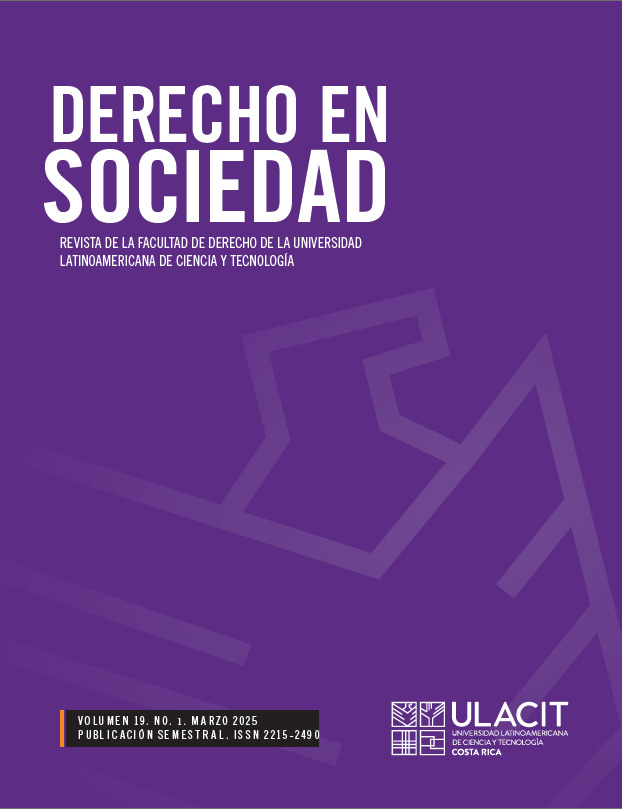The Right to Digital Oblivion in judicial matters in Colombia: Defense of Privacy or Risk of Censorship?

Published 2025-03-31
Keywords
- human rights ,
- freedom of expression ,
- data protection ,
- digital oblivion ,
- human rights limits
How to Cite
Copyright (c) 2025 Derecho en Sociedad

This work is licensed under a Creative Commons Attribution-NonCommercial-ShareAlike 4.0 International License.
Downloads
Abstract
This research delves into the relationship between human rights and technology, focusing on
the dynamics between freedom of expression and data protection in Colombia. It examines the
evolution of these rights, highlighting their interaction with technology and information. The main
study centers on whether the right to digital oblivion limits the freedom of information in Colombia,
exploring its conceptualization, evolution, and application both nationally and internationally, and
its impact on democracy and public access to information. Through a multidisciplinary approach,
it analyzes the legal, ethical, and social consequences of the right to digital oblivion, assessing its
effect on journalism and government transparency. The research also considers the implementation
of this right in the Colombian judicial system, seeking to balance the protection of personal data
with freedom of information and offering recommendations for legislators and media outlets.
References
- Alexy, R. (2003). Teoría de los derechos fundamentales. Centro de Estudios Políticos y Constitucionales.
- Asamblea Nacional Constituyente. (1991). Constitución Política de Colombia, Artículo 15.
- Barocas, S., & Nissenbaum, H. (2014). Big data’s end run around anonymity and consent. En Privacy, big data, and the public good: Frameworks for engagement (pp. 47-75). Cambridge University Press.
- Braithwaite, J. (2002). Restorative justice and responsive regulation. Oxford University Press. Comisión Interamericana de Derechos
- Humanos. (2000). Declaración de Principios sobre la Libertad de Expresión.
- Congreso de la República de Colombia. (2008). Ley Estatutaria 1266.
- Congreso de la República de Colombia. (2009). Ley 1273 de 2009.
- Congreso de la República de Colombia. (2012). Ley 1581 de 2012.
- Corte Constitucional de Colombia. (2011). Sentencia C-748.
- Directive 95/46/EC of the European Parliament and of the Council of 24 October 1995.
- European Court of Justice. (2014). Google Spain and Google (C-131/12).
- General Data Protection Regulation. (2016). 2016/679.
- Guallar, J., Codina, L., Freixa, P., & Pérez-Montoro, M. (2020). Desinformación, bulos, curación y verificación: Revisión de estudios en Iberoamérica 2017-2020. Telos: Revista de estudios interdisciplinarios en ciencias sociales, 22(3), 595-613.
- Mayer-Schönberger, V. (2009). Delete: The virtue of forgetting in the digital age. Princeton University Press.
- Rosen, J. (2012). The right to be forgotten. Stanford Law Review.

